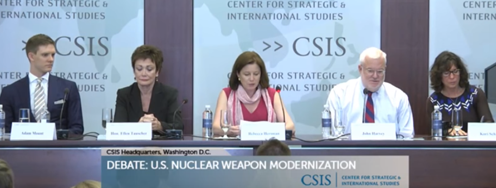Now's the Time to Realign NATO
Just weeks after outgoing Defense Secretary Robert Gates painted a grim picture of NATO’s future, experts weighed in with their own prescriptions for the alliance's nuclear future.
A slate of 25 specialists and former military and diplomatic officials delivered a letter to the 28 NATO member states and to Secretary General Anders Fogh Rasmussen.
"Today, NATO's nuclear weapons no longer serve the deterrence or war-fighting role they were intended for during the Cold War."
The recommendations were timed to influence NATO’s Defense and Deterrence Posture Review (DDPR), which serves as the blueprint for the alliance’s nuclear and conventional defense forces. After deliberation and drafting, the DDPR is expected to be released at the May 2012 NATO Summit in Chicago.
In addition to calling on NATO to recognize that basing nuclear weapons on European territory is no longer necessary, the letter urges the alliance to support further, verifiable reductions of all U.S. and Russian nuclear weapons; refrain from modernizing the nuclear-armed B-61 gravity bombs presently stationed throughout Europe and the aircraft that deliver them; and repeat assurances that future missile defense plans are not "targeted" at Russia's strategic forces.
In Washington, Ploughshares Fund grantee Brookings Institution Arms Control Initiative aired the debate in a panel discussion. Initiative Director Steven Pifer recommended that if the posture review does address tactical weapons, NATO should accept a Russian proposal requiring all nuclear weapons to be based on national territory, thus removing the U.S. warheads from Europe. (This recommendation is echoed in the Ploughshares Fund-sponsored bilateral Sustainable Partnership with Russia (SuPR) Group white paper.)
Pifer was joined by Ploughshares Fund grantee Hans Kristensen of the Federation of American Scientists and Franklin Miller of the Scowcroft Group. Miller served four years as a Special Assistant to President George W. Bush and as Senior Director for Defense Policy and Arms Control on the National Security Council staff.
Miller argued that the removal of tactical nuclear weapons would undermine the security of member states. Doing so would cheat new members of the security assurances that original members enjoyed for years.
Taking an opposing view, Kristensen shared his assessment of NATO concerns, asserting that member states are seeking security guarantees in whatever shape or form – not necessarily nuclear. By accepting this premise, NATO could then reform the concept of deterrence to not require tactical nuclear weapons, “and say, now we have completed the phase out of non-strategic nuclear weapons from Europe.”
In the twenty years following the end of the Cold War, NATO has the opportunity to align its force posture to real threats. Rethinking the role of nuclear weapons remains key to that process. It’s about time.


